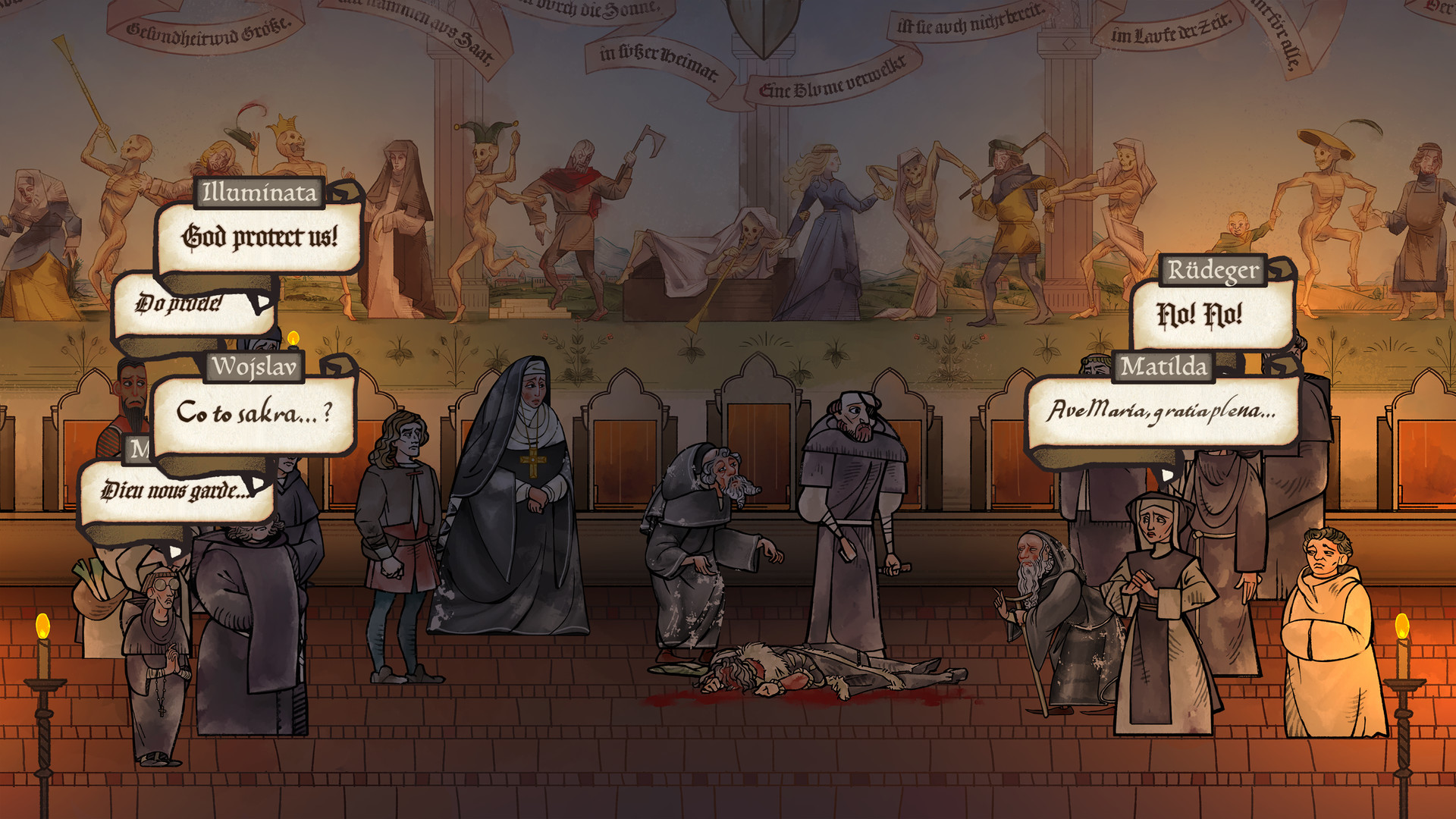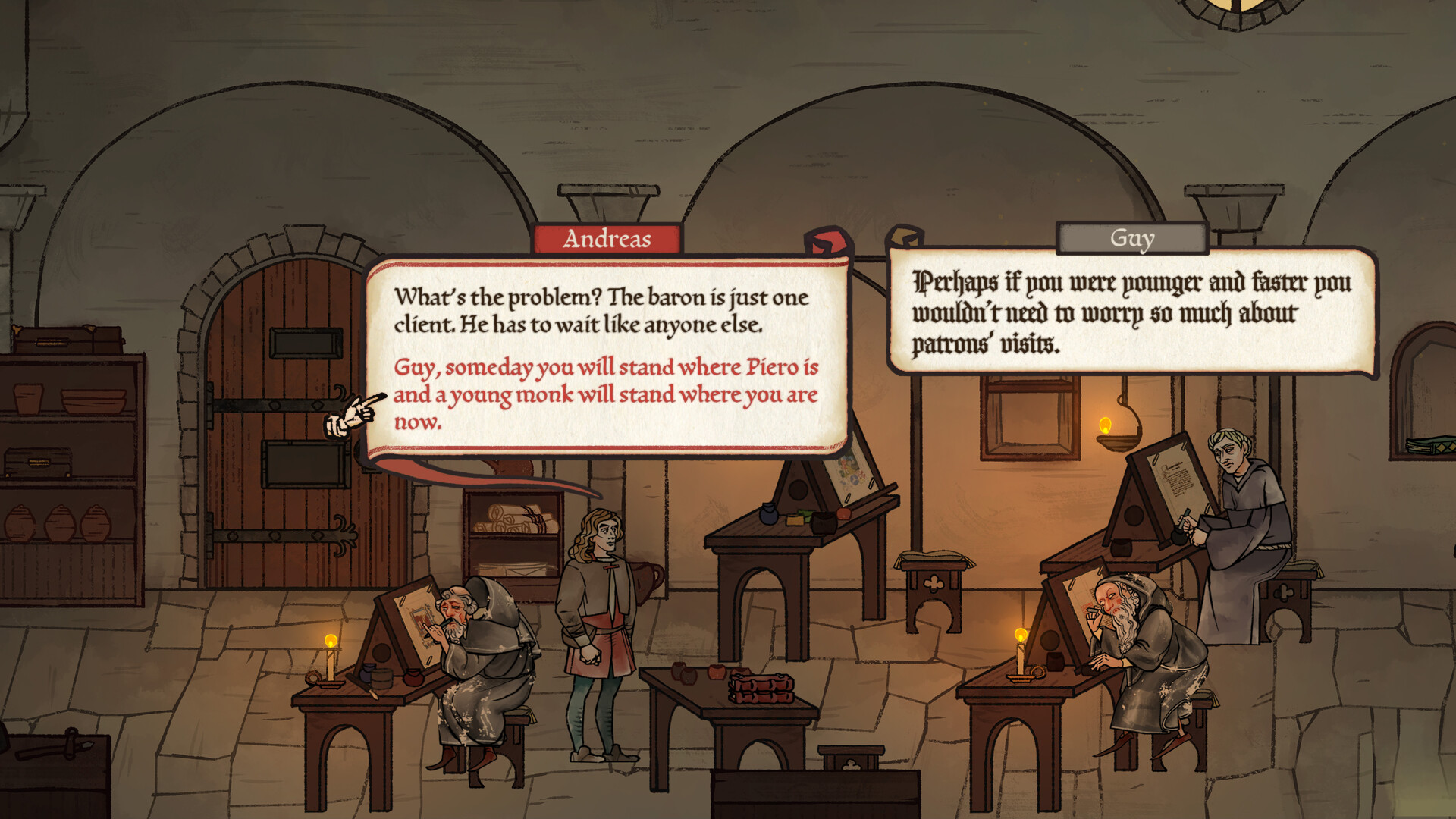This article contains mild spoilers for Pentiment.
It’s dinner time — “Vespers” in Christian canonical time — and I can’t decide what to do. I’ve got a murder to solve, and whom I dine with determines whom I can interrogate. Do I sup with my neighbors and hope to glean some information, while upholding societal niceties? Do I grab a bite with the weirdo gossip in the woods who buries the truth under a pile of slander? Or do I risk an incident by grilling the widow of the deceased?
I can’t turn the clock back and do over this crucial dinner appointment. The clock is ticking. The moment I make a choice, I lose the ability to make any other. Time marches on ever so cruelly. I’m stressed, over-scheduled, and paralyzed by indecision. In real life, this situation (which I am regrettably familiar with) exhausts me to no end. But it’s not real life; I’m playing Obsidian Entertainment’s latest genre-bending offering — a medieval murder mystery called Pentiment. And I’m having a blast.
In the world of Pentiment, everything matters. Every word you speak is remembered. Every decision you make will be remembered. Most importantly, every question you ask causes time to pass, hammered home by the Christian canonical clock that awaits you every time you pause the game. Much like in the real world, time is the most precious — and finite — resource in this 16th century whodunnit.

Pentiment is just the latest game to weaponize this anxiety into engaging gameplay. 2019’s Disco Elysium constantly shoved a ticking clock in your face as you navigated a complicated mystery, exchanging precious minutes for further information and boozy karaoke singalongs. The third, fourth, and fifth installments of the Persona franchise held the player accountable to a school calendar, tying specific objectives to limited days. Mobius Digital’s highly acclaimed Outer Wilds tasked players with stopping the end of a universe stuck in a 22-minute time loop; veterans of The Legend of Zelda: Majora’s Mask and its infamous three-day cycle might spit their drinks out at that one.
This philosophy of restraint feels radical in today’s gaming landscape. Ever since Bethesda encouraged a see-everything-do-everything approach with 2011’s Skyrim, the push over the last decade of AAA gaming has been for bigger landscapes to explore at your leisure and with little consequence. When I boot up Assassin’s Creed Valhalla or Horizon Forbidden West, it’s a meditative experience. The Legend of Zelda: Breath of the Wild is a far cry from the narrow scope of Majora’s Mask, giving you a massive digital playground to explore at your own pace. When I accidentally kill a bystander in Grand Theft Auto V, I barely register the action as noteworthy. The stress of a ticking clock is the last thing on my mind in these grand, high-budget experiences.
AA gaming presents a space where the comforts of the player can be challenged. It’s why Pentiment feels so refreshing. A narrow game world means a dense one, full of stories around every corner and fleshed-out characters that carry weight if they die. You know these people because you see them every day. The repetition breeds familiarity and nuanced, foundational storytelling in the same way that seeing your regular bar buddies carries its own unspoken pathos. Every conversation feels ephemeral, as it is in real life.

Thus, the small town that Pentiment depicts comes vividly alive in a way that Whiterun or Night City never could. The passage of time is taken even further, as Pentiment carries you through two decades of Andreas Maler’s life. How was this small town changed by my murder accusations and the executions that followed? Pentiment invites you to see the far-ranging consequences of your actions and to simmer in them.
Choice is often an illusion in video games. But introducing the fleeting ennui of time brings real consequence and agency to the experience. In the same way that a specific build shapes an RPG playthrough, your choices and time management form your time with Pentiment. If you’re anything like me, then you are going to want to boot the game up, again and again, to see how different choices — and better time management — change the experience. Unlike real life, video games give you a do-over.
Unless you save scum — in that case, you can disregard every word you just read.





Published: Nov 26, 2022 12:00 pm